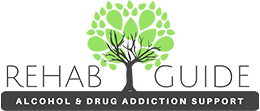It’s Addiction Awareness Week
Holistic Approaches to Addiction Recovery: Integrating Mind, Body, and Spirit
In recognition of Addiction Awareness Week (28th October – 4th November), the Lloyd’s Wellbeing Centre has collaborated with Rehab Guide to shed light on the challenges of addiction and provide information about holistic approaches towards recovery. Addiction is a pervasive issue that affects innumerable lives around the world, and this article serves as a beacon of hope for those seeking to break free from its grasp and those trying to help loved ones recover. Join us as we delve into the various dimensions of addiction and explore the transformative potential of a holistic approach toward healing and recovery.
Living with addiction can be challenging – it’s important to understand that it’s a chronic neuropsychological disorder and that it is distinct from simple misuse. Misuse does not always result in addiction; however, addiction does involve regular misuse of a substance. ₁ If we focus on alcohol addiction as an example of how addiction can take over an individual’s life, it’s hard for someone struggling with alcohol addiction to control their alcohol intake despite a decline in health, strained relationships, and negative effects on their professional life.
Continuing with this focus, people with severe alcohol addiction should never attempt to stop drinking abruptly. This is because although it is normal to experience withdrawal symptoms when an individual first treads the path of recovery, if someone stops drinking suddenly (the cold-turkey approach) without guidance and support, there can be serious complications, and may even prove fatal. The best way to handle addiction is to get the help of good alcohol rehab centres.
Even though the journey towards recovery is difficult, treatment is often effective. It’s essential to keep pushing forward, even when you experience setbacks. Life beyond addiction is worth every ounce of effort you put into recovery.
There’s a deep connection between the mind, body, and spirit, which ties our physical health intimately to our mental and spiritual well-being. When any of these is disturbed, the effect can ripple into others. Stress, for example, often shows up as physical symptoms. Meanwhile, a physical health issue can certainly affect our mental well-being.
Overall, addiction affects the whole person – mind, body, and spirit. And therefore, the journey towards recovery requires nurturing of all these elements. Let’s explore how holistic treatment methods address all aspects of lasting recovery by restoring the harmony between the mind, body, and spirit.
I. The Mind & Addiction Recovery
Treatment and recovery begin in our minds and with our internal strength. A lingering thought can gently steer someone towards seeking help for addiction, and recovery truly only begins with the admission that there’s a challenge to overcome.
Our conscious mind relies on reason and facts – a deficit in the functioning of the prefrontal cortex allows a substance (in this context, alcohol) to monopolise the reward circuit, impairing the ability of a person to stop consuming it. This means that the subconscious mind has the power to fuel an addiction. So, for addiction recovery, it is essential to reprogram the subconscious mind and boost the functioning of the conscious mind. To accomplish this, a combination of medications and behavioural healthcare is required.

Therapy can help find the root cause of addiction & help one process painful emotions.
Mindfulness-based cognitive therapy (MBCT) is a form of psychotherapy that can aid the process of recovery ₂. It involves cognitive behavioural therapy, meditation, and mindfulness. This combination of techniques helps people observe their thoughts and feelings in a non-judgemental manner, helping tackle dysfunctional thought patterns and distressing emotions before they spiral out of control and cause stress, depression, or anxiety – all of which can trigger a relapse. For a person undergoing recovery, this proves useful for better understanding and processing thoughts and feelings. Overall, MBC helps people recognise triggers and consciously shift gears from negativity to a positive and balanced state of mind.
People dealing with addiction often find themselves grappling with other mental health conditions. In such cases, both the addiction and the mental health condition may require separate treatment, and the chances of full recovery are much better when we address both conditions together. For example, sometimes people turn to alcohol because of underlying trauma or mental health issues. Once they start the recovery process, it becomes necessary to deal with this trauma or these mental health issues to prevent relapses. With cognitive-behavioural therapy, it’s easier to learn and practise healthy coping skills and strategies.
II. The Body & Addiction Recovery
Alcohol addiction wreaks havoc on the body. It can compromise the immune system, lead to high blood pressure, and increase the risk of chronic diseases. Exercising and taking care of the body can help heal some of the damage caused by alcohol.

Exercise, yoga, martial arts, or massage therapy may accelerate recovery.
Exercise, yoga, martial arts, or massage therapy may aid and accelerate the process of recovery. The key is to start with SMART (Specific, Measurable, Achievable, Relevant and Time-Bound) goals. Such goals will prove motivating and provide a sense of purpose. Achievement of fitness goals will improve body image and boost self-confidence. Fitness goals and routines can also bring structure to an individual’s life and provide the necessary distraction from cravings and triggers ₃. Not only this, but a good fitness routine can preoccupy the mind with constructive thoughts, making you feel more positive. Fundamentally, these physical activities can reset negative neurological pathways.
Insomnia is common during the alcohol recovery phase since the body is still getting used to the absence of mind-altering chemicals. Having trouble sleeping can really get in the way of recovery and tempt someone back toward alcohol. Moving the body (in any form of exercise) and having a soothing massage can boost sleep quality and help you drift off quickly.
Any enjoyable exercise (even simple activities like hiking, light gardening, and swimming) can help recovery and improve fitness. However, before starting a demanding workout routine, it is always a good idea to consult a certified expert. In the initial stages of recovery, the body may not have the strength to undergo a rigorous exercise programme. The best method would be to start small and increase the intensity gradually.
III. The Spirit & Addiction Recovery
Nourishing the spirit is also essential to the process of recovery. Addiction turns our focus inward and makes us fixate on those intense cravings for the substance we’re addicted to. To nourish the spirit, we have to look beyond the self and explore the meaning of our lives as well as our purpose. This may take the form of a connection to nature or a higher power.

Art & Journaling can be powerful tools for expressing emotion.
Taking time to nurture the spirit can help people on the path of recovery discover their inner reservoir of willpower and strength. It may help them find a new purpose and drive positive actions. Meditation and prayer can promote greater mindfulness and reinstate the harmony between the mind, body, and spirit. Overwhelming emotions are often the reason why people turn to alcohol. Discovering the art of journaling or diving into creative expression can be a powerful way to connect with our inner selves and navigate challenging emotions with grace. In particular, journaling can help us sort through our thoughts, gain mental clarity, reduce stress, discover new interests, and increase commitment to recovery.
Finding the right type of group support can also significantly aid the recovery process. Since the recovery process has multiple phases, professionals recommend and use various group treatment models to ensure that client needs are met. Group treatment models include interpersonal process groups, psychoeducational groups, skill development groups, cognitive-behavioural problem-solving groups, and support groups ₄. Other than these, there are relapse-prevention treatment groups and expressive groups (such as dance and psychodrama). A strong support network serves as a pillar during the most vulnerable parts of the recovery process – seek a sober companion to ease the transition to normal life. They’ll be able to offer support and accountability and help you sustain healthy recovery habits.
Dr. Alexander Lapa, MBBS, PG Dip Clin Ed, OA Dip CBT, OA Dip Psychology, SCOPE Certified
“A sober companion acts as a safeguard against a
relapse in real-world settings. In most cases, the
sober companion is there to be just that – a
companion. You can talk to this companion about
your feelings, triggers, and fears. Your sober
companion will walk with you through the
challenges of the process of recovery.”
IV. Holistic Integration & Addiction Recovery
Holistic therapists can guide people toward better well-being and recovery from addiction. These trained professionals combine techniques and modalities for cohesive, personalised treatment plans. They acquire an understanding of each client’s goals, needs, and challenges through assessment. These professionals empower people to take on an active role in the recovery process and provide the necessary support, education, and lifestyle guidance.
You can think of holistic therapy as a multifaceted, integrated, and comprehensive approach. Recovery will be sustainable only when good nutrition, adequate sleep, and healthy lifestyle choices are part of the recovery plan.

Volunteering can make easing back into society easier.
Volunteering is another activity that not only benefits others but also holds holistic benefits for the volunteer (it involves the mind, body, and spirit). Individuals in recovery can reconnect to community and culture through volunteering. Volunteering will help them meet other people with similar constructive interests, and it may prove to be a boon to their self-esteem ₅. It can also help overcome the pain of stigma and discrimination associated with addiction.
Wrapping Up
This Addiction Awareness Week, we’re highlighting how a holistic approach towards recovery reminds us that it is a very personal and unique journey for each individual. Recovery isn’t just about mending our bodies; it’s about refocusing our thoughts and healing our very essence. The path to recovery is filled with profound moments of self-discovery and growth: the mind, body, and spirit are intertwined, and this connection helps us rediscover our inner strength and the joy in life.
References
1. “Addiction: Definition, Symptoms, Withdrawal and Treatment”, Medical News Today,
www.medicalnewstoday.com/articles/323465
2. “Mindfulness-based treatment of addiction: current state of the field and envisioning the
next wave of research”, National Library of Medicine,
www.ncbi.nlm.nih.gov/pmc/articles/PMC5907295/
3. “How Exercise Can Help With Addiction Recovery”, WebMD,
www.webmd.com/mental-health/addiction/exercise-help-addiction-recovery
4. “2 Types of Groups Commonly Used in Substance Abuse Treatment”, National Library of Medicine,
www.ncbi.nlm.nih.gov/books/NBK64214/
5. “The Importance of Volunteering in Addiction Recovery”, AKUA Mind & Body,
www.akuamindbody.com/the-importance-of-volunteering-in-addiction-recovery/









